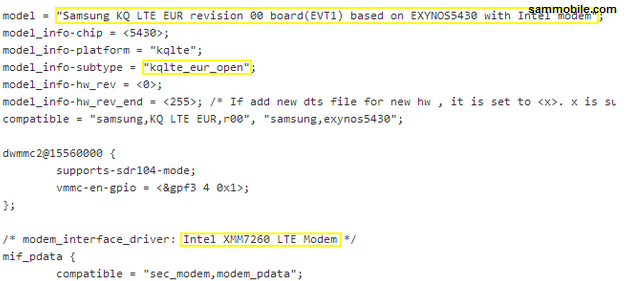Samsung’s Galaxy S5 has been released for several weeks now, and since then we are now able to paint a better picture of what Samsung’s plans for future devices might be.
Several months ago, rumours were flowing abound about how Samsung would release two versions of the Galaxy S5: the standard model that we know all know about by now, and a much talked about premium variant.
Firstly, we’ll dwell a bit into the the “standard” version to clear up an important aspect of the rumours surrounding it over the last few months: Was it supposed to come with a QHD screen or not?
The answer is yes! Samsung’s prototype’s for project K, a.k.a. the G900, was firstly designed with their new 1440×2560 5.2” AMOLED screen. The 3G version of the Galaxy S5, the G900H, or also “k3g” was initially prototyped with the QHD screen, but abandoned it in its third (out of ten) prototype/revision in favor of the FHD that was kept until the end. The first revisions of the Snapdragon model show the same sign: “klte” first adorned the QHD screen before abandoning it, explaining the early leaks in December which showcased the high resolution.

Rumours of Samsung having production problems with the QHD screen and not able to provide the quantities needed for the S5 seem validated.
Galaxy S5 “Prime”?
Contrary to what Samsung’s Vice Chairman claims, they do indeed have had a premium version in the pipeline for quite some time. While the standard S5 is internally called project K, the prime version is the KQ.
Samsung’s latest device sources are able to paint an extremely accurate picture of what this device is. Before going into detail, we need to mention that KGI Securities analyst Ming-Chi Kuo properly predicted both the S5’s specifications back in January with almost perfect accuracy.
The KQ is in a middle- to late- phase of development and (in one model) comes with Samsung’s Exynos 5430, Intel LTE and the much awaited QHD screen.

The Exynos 5430 is an upgrade to the 5422: With non-final device clocks targeting 2.1GHz on the A15’s and 1.5GHz on the A7’s it provides a small boost in CPU power. The GPU remains a Mali Midgard architecture (T6XX) of unknown core count, but gets a boost to 600MHz from the 533MHz in the 5420 and 5422. The 5430’s display controller is completely redesigned, and might help in driving the high-resolution display at high efficiency. The 5430 introduces a HEVC hardware decoder for the first time, a critical component for future longevity of the device as H.265 will start to replace H.264 as the de-facto video codec for media consumption. Additionally, a new dedicated (Cortex A5) co-processor for audio encoding, decoding and audio equalization, which Samsung calls “SEIREN” has been introduced into the SoC.
Probably Kuo’s most important prediction was Samsung’s use of a 20nm manufacturing process on the 5430, which would put the company at the head-front of the race to the new process. Inspection of the voltages of the CPUs did show that the A7 cores received a massive reduction in voltage of up to 125mV, which is a tell-tale sign of a manufacturing process improvement. The power management IC’s minimum voltages for the key SoC rails also got lowered from 800mV to 600mV. However, the voltage reduction couldn’t be confirmed for other blocks; the early drivers are in an too incomplete state to be able to come to a conclusion. As such, we can’t confirm, nor deny this claim.
Intel makes its LTE debut.
A very important component shift comes unexpected: Connectivity for the European and international model (kqlte_eur) are achieved through an Intel XMM7260 Category 6 (300mbit/s) LTE modem. This would be Intel’s first incursion into a high-end mobile device with LTE, and break Qualcomm’s monopoly in the western market. The Korean version comes with Samsung’s own LTE modem, codenamed Shannon300 (SS300).
Audio is provided by the same Wolfson Microelectronics WM5110 platform as found on the G900H model of the S5.
The Korean model (kqlte_kor), as traditional, comes with an added TDMB receiver.
Nothing for certain, more devices to come.
For anybody who’s been paying attention, you will have noticed that there is no mention of an US model. Recent leaks depicting the a G906S with Snapdragon 805 would very well be the counterpart of the KQ to be used in various markets. The S post-fix in the model numbers usually describe a Korean SKT variant, if true, Samsung is evaluating once again which SoC to choose for their flag-ship.
Between all the prototype devices, one can also find a new high-end device, codenamed “a3w5”, sporting a QHD screen and deriving from the KQ platform, coming in Wifi, 3G, and LTE versions, pointing out the possibility of a tablet device. Also an “S” (slte_eur) device is described with the same specifications as the KQ.
In the end, all we can tell that Samsung is working hard in a quick follow-up to the Galaxy S5. With LG’s G3 coming into market in the next few months to trump the S5 in terms of specs, Samsung is poised to already prepare a counter-offer to be able to compete in the high-end segment. If, and when the KQ, S or other derivatives will come to market is something we cannot tell. However all are in advanced stages of development and should see light within the quarter.







